 Petzlover
Petzlover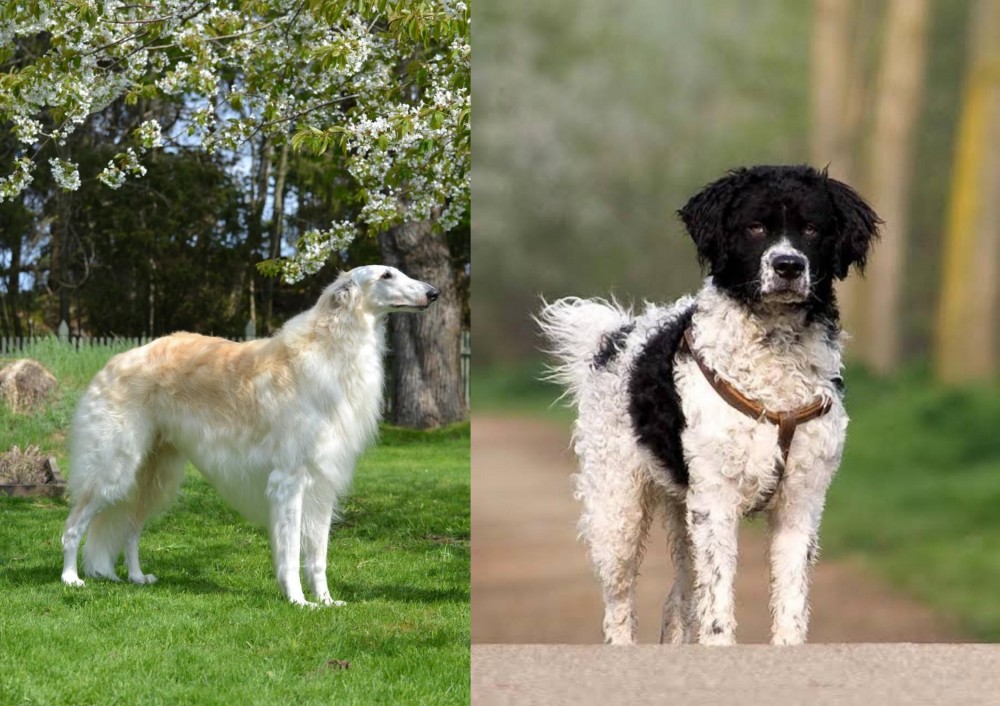 Russian Hound is originated from Russia but Wetterhoun is originated from Netherlands. Russian Hound may grow 8 cm / 4 inches higher than Wetterhoun. Russian Hound may weigh 10 kg / 23 pounds more than Wetterhoun. Both Russian Hound and Wetterhoun has almost same life span. Both Russian Hound and Wetterhoun has same litter size. Russian Hound requires Low Maintenance. But Wetterhoun requires Moderate Maintenance
Russian Hound is originated from Russia but Wetterhoun is originated from Netherlands. Russian Hound may grow 8 cm / 4 inches higher than Wetterhoun. Russian Hound may weigh 10 kg / 23 pounds more than Wetterhoun. Both Russian Hound and Wetterhoun has almost same life span. Both Russian Hound and Wetterhoun has same litter size. Russian Hound requires Low Maintenance. But Wetterhoun requires Moderate Maintenance
 There are sportsmen and hunters who appreciate the versatile Russian Hound. The Russian Hound has been a popular working breed in its homeland for a long time as it is an ancient dog breed.
There are sportsmen and hunters who appreciate the versatile Russian Hound. The Russian Hound has been a popular working breed in its homeland for a long time as it is an ancient dog breed.
This is an ancient dog breed, being developed by crossing common hunting dogs with indigenous ovcharkas and Laikas. Later European hunting dogs were also introduced into the mix.
The dogs numbers have declined but were later revived in the late 1800s. The first breed standard for the Russian Hound was created in 1896. Known as the Russkaya Gontchaya, this tough dog is still popular in all parts of Russia.
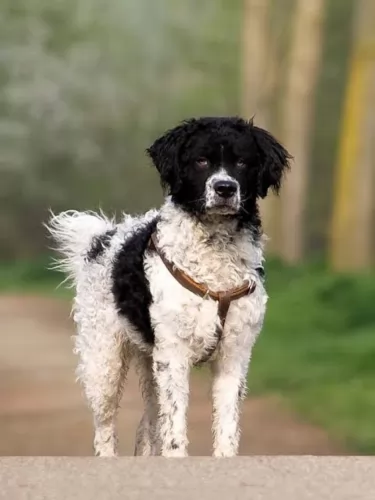 The Wetterhoun is a water dog developed in the 1500 or 1600s to hunt otters. The breed was developed by the Frisians in the Netherlands near the Northwest corner. In addition to catching otters in the lakes near by, they were also used as gundogs to hunt game. They are a fearless, tough and loyal working dog. They love the water and they are build for it with a waterproof coat and tight tail that is spiraled. They will swim happily in freezing cold weather as well.
The Wetterhoun is a water dog developed in the 1500 or 1600s to hunt otters. The breed was developed by the Frisians in the Netherlands near the Northwest corner. In addition to catching otters in the lakes near by, they were also used as gundogs to hunt game. They are a fearless, tough and loyal working dog. They love the water and they are build for it with a waterproof coat and tight tail that is spiraled. They will swim happily in freezing cold weather as well.
The Wetterhoun is rare and not seen outside of the Netherlands. Descendent of the Water Dog, that is now extinct, he is probably a relative of many spaniel types that also call the Water Dog their ancestor. Yet the Wetterhoun is not a spaniel or spaniel type.
The breed almost disappeared during World War II, like many others, they brought back and are now becoming more and more popular. The breed is only recognized by the Federation Cynologique Internationale and the United Kennel Club. AKC does not recognize them, but there are many hunting clubs and other registries that do. They are often promoted as one of the rare breeds.
 The Russian Hound is a medium to large sized dog. He stands at roughly 62 – 67cm in height and weighs roughly 36 to 45kg. The dog however is available in a number of different sizes.
The Russian Hound is a medium to large sized dog. He stands at roughly 62 – 67cm in height and weighs roughly 36 to 45kg. The dog however is available in a number of different sizes.
The coat is fairly short and dense, becoming fuller in Winter. The coat color is fawnish with a darker brown, blackish saddle on the back. The paws have some white markings. The eyes are medium length and the tail is long and held down.
The Russian Hound is a peaceful, calm dog, not making a fuss around strangers, but accepting them well. He may be calm, but he is independent and strong willed.
Training and socialization will be good for him, making him obedient and well mannered.
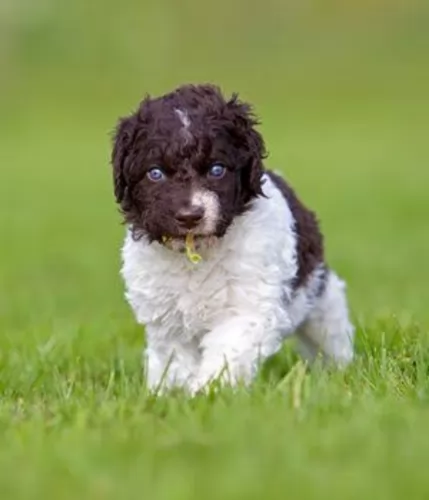 The Wetterhoun is a compact, medium sized breed weighing about 55 to 77 pounds. Great water dogs they are athletically built with low set ears hanging next to their heads, a waterproof coat, distinctive eyes with a very serious expression and a tightly curled tail held aloft over the back. Their coat is waterproof, somewhat oily, curly and thick. The fur is of a smoother texture on the ears, head, and legs. They can be solid black, solid brown, brown with white, or black with white.
The Wetterhoun is a compact, medium sized breed weighing about 55 to 77 pounds. Great water dogs they are athletically built with low set ears hanging next to their heads, a waterproof coat, distinctive eyes with a very serious expression and a tightly curled tail held aloft over the back. Their coat is waterproof, somewhat oily, curly and thick. The fur is of a smoother texture on the ears, head, and legs. They can be solid black, solid brown, brown with white, or black with white.
 Everybody wants a peaceful, loving dog that can be a good pet and companion without causing a lot of trouble. The Russian hound is a peaceful, loving, loyal dog who is going to make any family a wonderful 4-legged fried.
Everybody wants a peaceful, loving dog that can be a good pet and companion without causing a lot of trouble. The Russian hound is a peaceful, loving, loyal dog who is going to make any family a wonderful 4-legged fried.
He can adapt to life in the city or the countryside so long as he is given a good loving home and plenty of exercise.
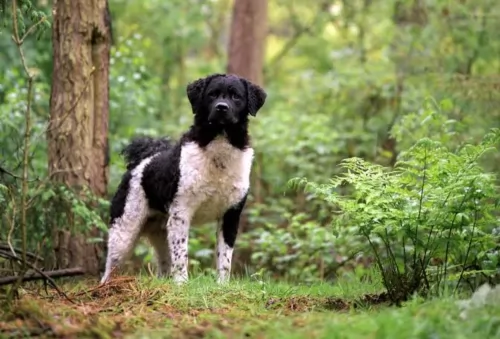 3.Adaptability – not a great apartment dog even though he is not that big. They need space. They need a job and they will finish their job at their own pace no matter what you say. It is impossible to train this trait out of them.
3.Adaptability – not a great apartment dog even though he is not that big. They need space. They need a job and they will finish their job at their own pace no matter what you say. It is impossible to train this trait out of them.
4.Learning ability Very high learning ability, very eager to learn and very smart. He is stubborn about finishing whatever job he is working on
 The Russian Hound is a healthy breed. Nonetheless even the healthiest dog breeds can become ill.
The Russian Hound is a healthy breed. Nonetheless even the healthiest dog breeds can become ill.
Good food, exercise and lots of love and attention can ensure a long life for him.
However every dog can have one of the many common dog illnesses there are. Toothache can be a serious problem for your pet because if you don’t look in his mouth you won’t be able to tell if he has a bad, painful tooth.
Dogs can also break their teeth, causing sharp, jutting pieces which cut the gums. They can also get gum disease. Plaque can cause a whole lot of bacteria in your pets mouth. With the increase in bacteria, your dog’s health problems increase too. It is imperative to look in your pets mouth and speak to your vet about canine dental maintenance.
Eye infection are a common problem with dogs, and an eye infection can be from allergies. Yellow pus can indicate an infection. It is best to speak to your vet because some eye infections can lead to blindness if left untreated.
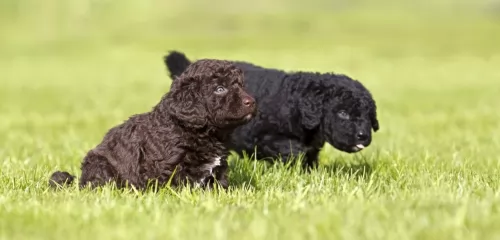 A hardy and healthy breed they do not have severe health issues. But like every his
A hardy and healthy breed they do not have severe health issues. But like every his
• Ear Infections – like any breed with hanging ears they can be prone to infection. This is particularly true because the dogs are in the water a lot. Be sure to clean and dry them after every water episode and inspect them on a regular basis even if the dog has not been in the water.
• Patellar Luxation – Knee cap issue with movement and inflammation. Can cause lameness and arthritis.
 As a hunting dog, you will need to ensure your Russian Hound gets enough exercise. He will love his walks with you but will want to be let off his leash when in the park. He loves the opportunity to run free. Games at home in the garden will also be good for this large dog.
As a hunting dog, you will need to ensure your Russian Hound gets enough exercise. He will love his walks with you but will want to be let off his leash when in the park. He loves the opportunity to run free. Games at home in the garden will also be good for this large dog.
Provide your pet with a nice, warm, dry sleeping area.
Make sure your pet’s vaccines are up to date.
Have your dog neutered or spayed to prevent unplanned puppies.
Groom your Russian Hound by brushing him twice a week.
Check him over for lumps while brushing him.
Check inside his ears for signs of redness.
Trim his nails.
Look at his eyes and make sure they are clear with no signs of discharge.
Check inside the mouth for rotten or bad teeth as this can cause tremendous pain and also cause toxins to get into the bloodstream.
The Russian Hound relies on vitamin and mineral enriched food. The best commercially manufactured dog foods can provide this. These foods are wonderfully convenient. Try not to give your dog dry kibble day after day, but vary it twice a week with some home-made food.
Simply add into one big pot chicken, brown rice or pasta and spinach, sweet potatoes and carrots. This food can all be chopped up and added in to the dry kibble twice a week. It is wonderfully tasty for your your canine friend. Dogs thrive on simple, consistent meals. Ty and add some raw meat to his food occasionally.
Ensure there is always a bowl of fresh, cool water within his reach.
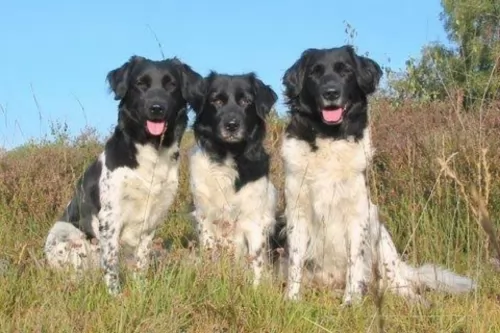 1Feeding the puppy -This is an active, hunting and swimming breed. They need good nutrition and high quality puppy food. A food formulated for active breeds or hunting dogs would be best. Feed your puppy in smaller amounts 3-4 times per day.
1Feeding the puppy -This is an active, hunting and swimming breed. They need good nutrition and high quality puppy food. A food formulated for active breeds or hunting dogs would be best. Feed your puppy in smaller amounts 3-4 times per day.
2.Feeding the adult - This is an active, hunting and swimming breed. They need good nutrition and high quality adult food. A food formulated for active breeds or hunting dogs would be best. Feed your adult twice per day.
4. Games and Exercises – This is an active working dog that needs a lot of exercise every day. A 30 minute walk is only the beginning. They need outdoor time to play and run. They need to swim if at all possible.